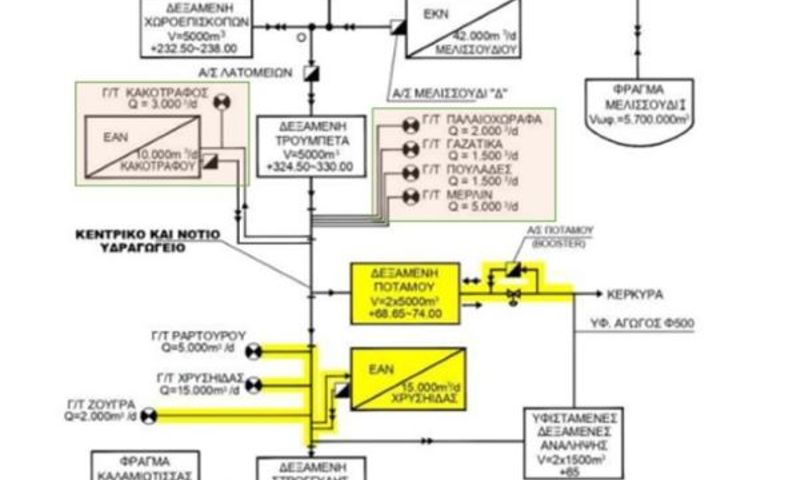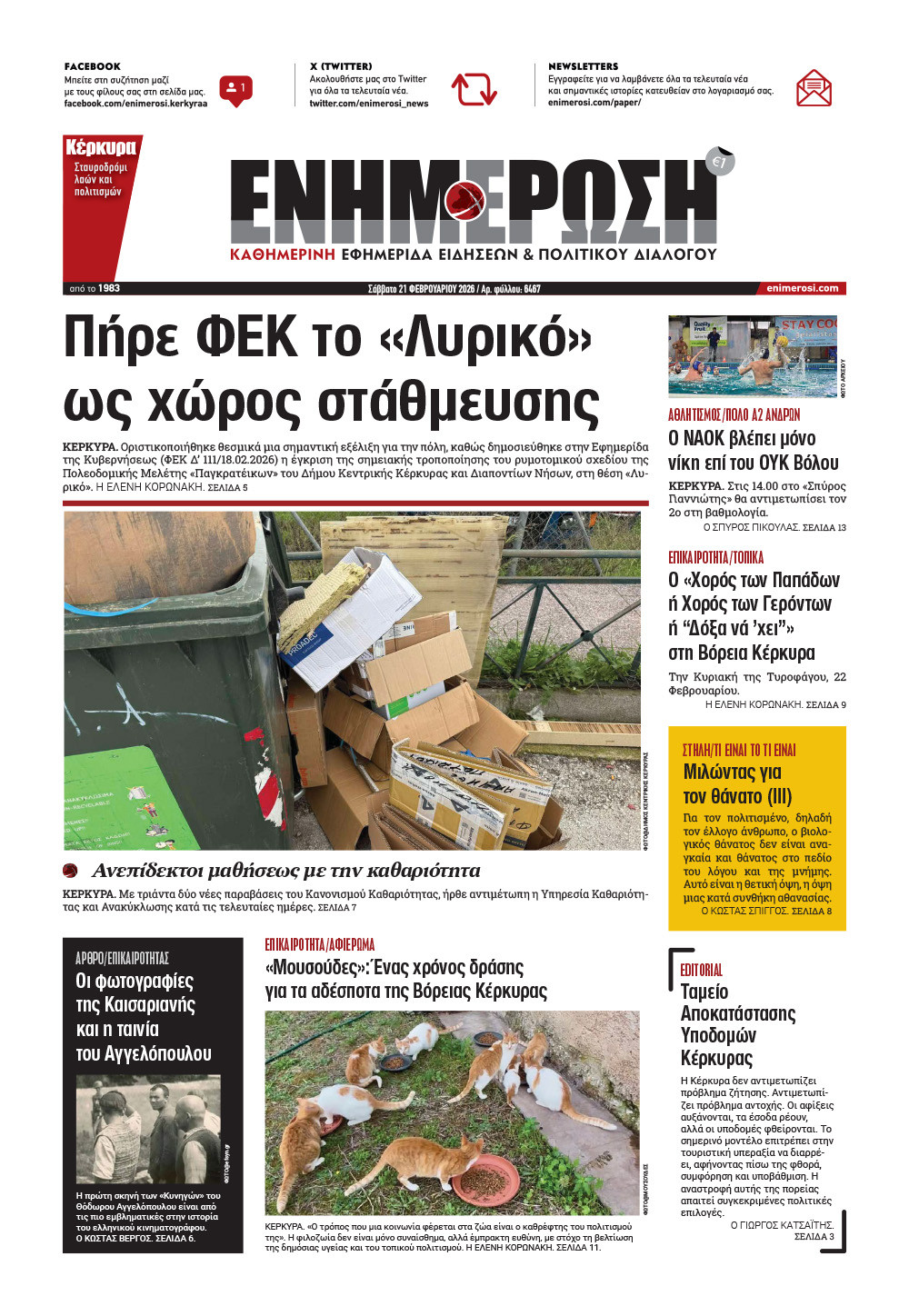DEYAK to become water management body
 The plan for the island΄s water supply from the call for expression of interest.
The plan for the island΄s water supply from the call for expression of interest.
DEYAK
09 Mar 2023
/ 23:48
ATHENS. The management body will be responsible for the quantitative distribution of water and the pricing of water supply services.
The deadline for expression of interest for the Corfu water supply project ended on 28 February and three companies responded. The Ministry of Transport and Infrastructure's plan has three stages and will cost €195m. It concerns the funding, construction, operation and maintenance of the projects. The contract to be signed with the private body will be valid for 30 years, of which 4 will be for the study and construction of the project and the remaining 26 for its operation.
The public sector's financial participation will be €60m, the maximum amount provided through the Public Investment Programme, which is being implemented in the framework of the National Recovery and Resilience Plan 'Greece 2.0'. The rest will be own or borrowed funds from the private body.
In three phases
The first phase concerns water softening facilities and works in Chrysida as part of the large Corfu water supply project.
The second phase will include, amongst others, the Melissoudi, Kyprianades and Kalamiotissa dams with associated technical works and the Melissoudi and Kalamiotissa water purification facilities, external networks of about 220km, tanks and the installation of a SCADA system.
The third phase concerns South Corfu and in particular the new Melitiaion water tank. It will be constructed with funding from the ESPA programme and it is expected to be put out to tender within 2023. The exact technical description of the project will be made with the contract that will be signed between the public sector and the selected candidate from the second phase of the tender.
There are also sub-projects, which will be implemented in the future with a separate contract, and others which will also be implemented in the future but without any provision (such as the Kakotrafos water softening facility).
The relationship with the private body
Regarding the funding of the project, the call for expression of interest stated that "under the proposed partnership, the private body will fund the project, while the contracting authority will make annual payments, in accordance with the relevant payment mechanism, which will be included in the partnership agreement and will be based on quality, performance and results specifications. No payments will be made until the project and related services meet the specifications of the partnership contract, as it will be certified by an independent auditor. In addition, payments will be reduced if the project performance deviates from the set performance standards of the partnership contract."
The Deputy Minister for Infrastructure Giorgos Karayiannis stated the following: "A major project that has been a longstanding demand of the citizens is now taking shape. Corfu's water supply with drinking water of excellent quality and in a sufficient quantity to meet the needs of residents and visitors for the next decades was a pre-election promise we made and which we are implementing. We also put an end to waste as from today rainwater will end up in the sea."
The maintenance of DEYA is subject to the study
The call for expression of interest stated that "the private body will not benefit from the project, as it will not have the right to commercially exploit the project nor will it be entitled to claim any money from end-users. Therefore, the benefit that the private body will rightfully have, is the payments to be made by the contracting authority.
The management of the project by the private partner begins from the dams to the water tanks. The quantitative distribution of water and the pricing of water supply services will be carried out by the management body, which will be proposed and subsequently established based on a study. The study of the management body will take into account the existing water suppliers in the study area (DEYA, local authorities), the existing legal framework for the establishment of water management bodies, as well as the experience of how such bodies are organised and operate abroad."
The public sector's financial participation will be €60m, the maximum amount provided through the Public Investment Programme, which is being implemented in the framework of the National Recovery and Resilience Plan 'Greece 2.0'. The rest will be own or borrowed funds from the private body.
In three phases
The first phase concerns water softening facilities and works in Chrysida as part of the large Corfu water supply project.
The second phase will include, amongst others, the Melissoudi, Kyprianades and Kalamiotissa dams with associated technical works and the Melissoudi and Kalamiotissa water purification facilities, external networks of about 220km, tanks and the installation of a SCADA system.
The third phase concerns South Corfu and in particular the new Melitiaion water tank. It will be constructed with funding from the ESPA programme and it is expected to be put out to tender within 2023. The exact technical description of the project will be made with the contract that will be signed between the public sector and the selected candidate from the second phase of the tender.
There are also sub-projects, which will be implemented in the future with a separate contract, and others which will also be implemented in the future but without any provision (such as the Kakotrafos water softening facility).
The relationship with the private body
Regarding the funding of the project, the call for expression of interest stated that "under the proposed partnership, the private body will fund the project, while the contracting authority will make annual payments, in accordance with the relevant payment mechanism, which will be included in the partnership agreement and will be based on quality, performance and results specifications. No payments will be made until the project and related services meet the specifications of the partnership contract, as it will be certified by an independent auditor. In addition, payments will be reduced if the project performance deviates from the set performance standards of the partnership contract."
The Deputy Minister for Infrastructure Giorgos Karayiannis stated the following: "A major project that has been a longstanding demand of the citizens is now taking shape. Corfu's water supply with drinking water of excellent quality and in a sufficient quantity to meet the needs of residents and visitors for the next decades was a pre-election promise we made and which we are implementing. We also put an end to waste as from today rainwater will end up in the sea."
The maintenance of DEYA is subject to the study
The call for expression of interest stated that "the private body will not benefit from the project, as it will not have the right to commercially exploit the project nor will it be entitled to claim any money from end-users. Therefore, the benefit that the private body will rightfully have, is the payments to be made by the contracting authority.
The management of the project by the private partner begins from the dams to the water tanks. The quantitative distribution of water and the pricing of water supply services will be carried out by the management body, which will be proposed and subsequently established based on a study. The study of the management body will take into account the existing water suppliers in the study area (DEYA, local authorities), the existing legal framework for the establishment of water management bodies, as well as the experience of how such bodies are organised and operate abroad."












